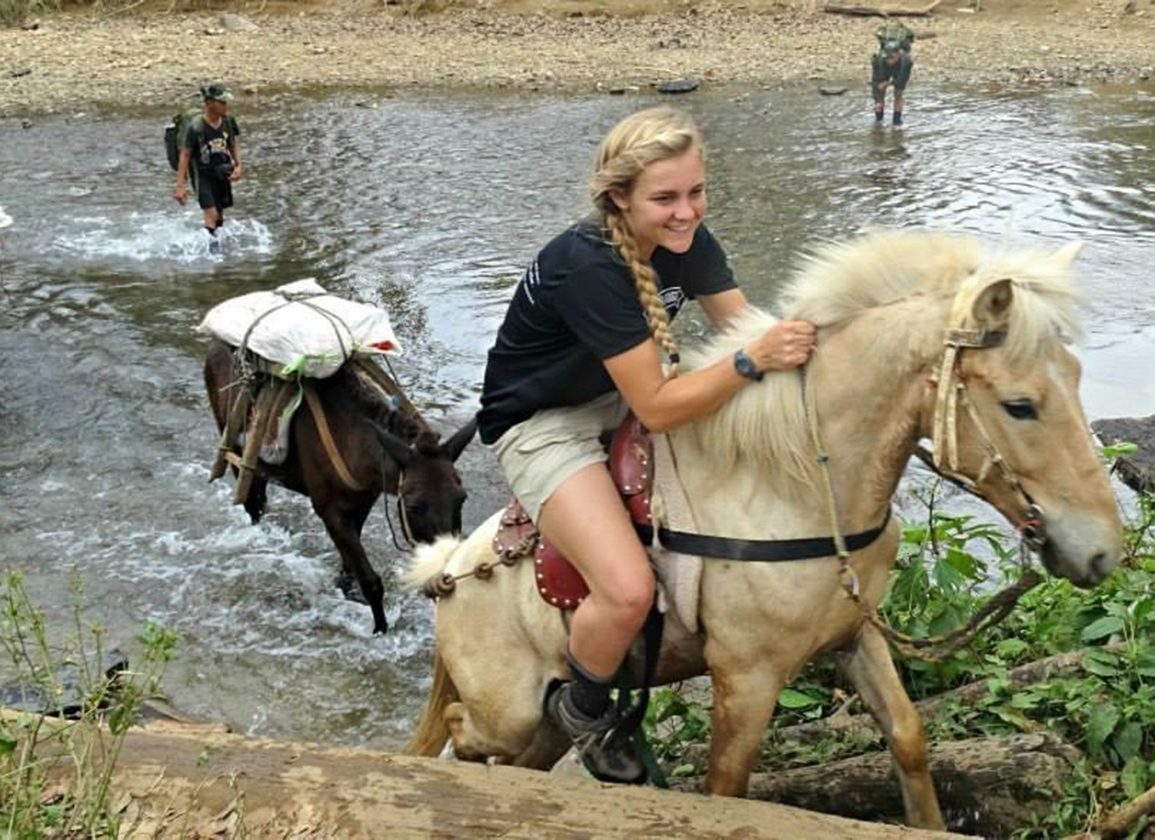By Ferrin Peterson
Editor's note: Jockey Ferrin Peterson, DVM, has embarked on a charitable mission to Southeast Asia to help refugees care for their animals in war-torn areas, bringing veterinary knowledge and supplies to villagers with no other access to care. She will be contributing a blog to the TDN when conditions permit.
Helping the under-served groups of the world was modeled to me from a young age. My parents had worked in Mexico before raising our family, and I have had relatives who served in China, Turkey, India, and Spain as engineers, teachers, and musicians. This was foundational in my upbringing, and it instilled in me a passion to use my individual interests and skillsets to help those in need.
While pursuing my Bachelor's in Animal Science at Cal Poly San Luis Obispo, I had colleagues who were part of organizations such as Engineers Without Borders and Doctors Without Borders. I saw a breach in the care for the animals that support the livelihood of people living in under-served parts of the world. I reached out to several of my professors, and one connected me with a humanitarian organization called The Free Burma Rangers (FBR). This group helps refugees in the jungles of Southeast Asia and uses a pack animal team comprised of mules and Mongolian ponies to carry supplies to remote villages, where they have no veterinary care.
On my initial trip, the refugees had lost several of their pack animals due to an unknown illness, and diagnosing the lethal disease became the focus of my first trip to Southeast Asia. I had little veterinary training at the time but connected with my future professor, Dr. Eric Davis, at UC Davis who guided me in sample collection and provided the lab upon my return. We diagnosed the disease as trypanosomiasis, which is carried by a tsetse fly vector and is endemic in Asia and Africa.
I returned two years later while I was a veterinary student at UC Davis. The pack animal team had stayed relatively healthy, so the focus of my second trip was to branch out to help other species. The villages we visit are far off the grid and we backpacked 10 hours into the jungle through steep mountains to reach our first village. Those villagers had never met a veterinarian, and although I was not officially a Doctor of Veterinary Medicine (DVM) yet, I provided training in basic animal husbandry. I experienced the gratitude they shared by improving the health of their animals who were essential to their livelihood. It was apparent that the villagers appreciated their animals and were providing the best care they knew under limited conditions and no training. I helped them with their water buffalo, pigs, chickens, dogs, cats, and even a monkey.
 I am sitting in the airport about to embark on my third trip, my first as an official DVM. Just weeks after breezing some of the top Thoroughbreds in the world in preparation for the Breeders' Cup, I now have the opportunity to work with some of the most underrated equids I know: tough, selfless, and also life-changing to their owners. I think that is one of the beautiful things about horses worldwide: to witness the important role they play in a wide variety of uses.
I am sitting in the airport about to embark on my third trip, my first as an official DVM. Just weeks after breezing some of the top Thoroughbreds in the world in preparation for the Breeders' Cup, I now have the opportunity to work with some of the most underrated equids I know: tough, selfless, and also life-changing to their owners. I think that is one of the beautiful things about horses worldwide: to witness the important role they play in a wide variety of uses.
The Free Burma Rangers reached out to me this past spring, as they had lost four members of their pack animal team this year, three of which I had worked with on previous trips. The symptoms sound like a combination of parasites, colic, and malnutrition. Their base camp lost their entire flock of chickens and herd of swine this year, so there have been some devastating losses. The base camp provides essential medical care, as it is the only medical facility of its kind within days of travel. FBR has trained local medics and built a basic facility to care for people. In previous trips, I witnessed a woman who had walked all night in labor to reach the medical facility. I also met a man who had traveled for several days with a snake bite that needed treatment. To realize that the medics serving at the base camp lost two important food sources in their pigs and chickens is very concerning.
When my plane lands in Southeast Asia, I will connect with a mentor of mine, Dr Peter Quesenberry, who is also a UC Davis Veterinary School alumni and has dedicated his career to the underserved animals and their owners in Asia. He wrote the book “Where There Is No Animal Doctor,” inspired by “Where There Is No Doctor,” the most widely used health care manual in the world. I use Dr. Quesenberry's book in my training sessions with the villagers. We can turn to the same page and while I read in English they follow along from their copies written in their own language and accompanied with simple illustrations. It has been instrumental in the language barrier hurdle.
Dr. Quesenberry will take me to local shops in town to purchase the rest of the supplies I need: vaccines, dewormers and ointments to name a few. While I am bringing a large pack with me from home, it is important to source as much as possible from local stores. This supports their economy and familiarizes the local people with the brands of vaccines and medications so that they can purchase more on their own for long-term care. Through the generosity of my supporters, I will be stocking up on essential supplies before I head off the grid.
I will backpack in everything needed to live off the grid for two weeks. Anyone who has backpacked understands the delicate balance of bringing the necessities while keeping your pack as light as possible. On my first trip, I started handing off the snacks I had packed out of desperation to lighten my load as we ascended yet another mountain. The 10 hours of backpacking is up and down steep mountains. Upon reaching the summit of one mountain, you have to go back down the other side, only to do it all over again on the next mountain. FBR makes these trips during the dry season, which is our winter and early spring, as they say it is too difficult to travel during the rainy season. I have been training for the mountainous terrain as best I can by running hills and stairs in Kentucky, but I know it cannot compare. It is always humbling as I agonize up a mountain, despite fitness and proper hiking gear, and then look over to see a villager easily traversing the same terrain in plastic flip flops. I am always impressed by how tough these people are who have never known the comforts I take for granted.
The first leg of the trip ends with a bit of trouble, as my flight to London arrives late and I miss my connection by 15 minutes. But all in all, it's a small price to pay, and I appreciate the encouragement and support of others who helped make this happen- my connections in racing who support my absence from the circuit for a few weeks, Back on Track USA who helped with outfitting me for the trip, and every one who donated through www.freeburmarangers.com.
Tomorrow: Day 1-What's On Tap
Not a subscriber? Click here to sign up for the daily PDF or alerts.






